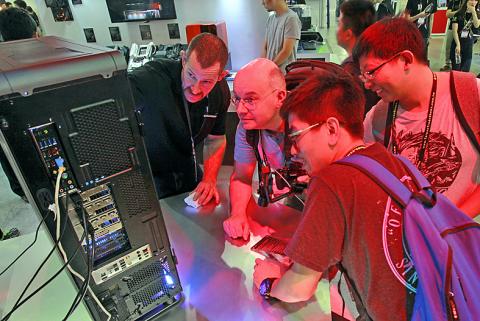Taipei Computer Association chairman Tung Tzu-hsien (童子賢) yesterday called for a better investment environment and a more open-minded attitude in response to the government’s plan to build an “Asian Silicon Valley” for start-ups and firms producing innovative products.
“It might not work if the government simply wants to copy the success of Silicon Valley,” Tung told a forum focusing on start-ups at Computex Taipei.
Tung’s remarks came after President Tsai Ing-wen (蔡英文) told the opening ceremony of Computex that the government is to carry out an “Asian Silicon Valley” initiative in Taoyuan, connecting domestic and international resources in manufacturing and research and development in a bid to develop Internet of Things (IOT) supply chains.

Photo: Chiang Ying-ying, AP
Silicon Valley represents not only a location, but an adventurous spirit of innovation and creation, despite the failures of numerous start-ups over the decades, Tung said at the forum.
He said the government is thinking from a perspective of manufacturing hardware, but it is also important to think about deregulating to improve the investment environment, such as easing the regulations that allow foreigners to take white-collar jobs in Taiwan.
It is equally important that society has an open-minded attitude to encouraging start-ups, regardless of nationality or gender, he said.

Photo: Chiang Ying-ying, AP
“Many of the important international enterprises in Silicon Valley were not founded by Americans,” Tung said.
He said that Taiwan has adequate funds and talent for new start-ups, but he is not certain if society is tolerant enough to support foreign start-ups.
If the government’s start-ups initiative is only for Taiwanese firms, then such a mind-set would not help Taiwan to achieve its goal of becoming an Asian innovation hub, he said.
Tung said he has also noticed that society has overly emphasized the difficulties that start-ups might face in the early stages of their development.
“Our education system needs to change. We should encourage the younger generation to think outside of the box, be adventurous and not afraid of failure,” Tung said.
Crowdfunding company Backer-Founder (貝殼放大) chief executive Tahan Lin (林大涵) said he thinks it is not necessary to build an “Asian Silicon Valley” in Taiwan, as it is more important to help investors cooperate with start-ups.
What start-up companies need is investors who understand their vision and their added-value, rather than having a location like an industrial park in northern Taiwan, Lin said.
InnoVEX, an exhibition featuring 217 start-ups from 22 nations, is taking place at Taipei World Trade Center Exhibition Hall 3, along with Computex Taipei.
Organizers the Taiwan External Trade Development Council (TAITRA) and the Taipei Computer Association said five main fields — hardware and the Internet of Things; B2B software; cloud applications; consumer technology; and health technology — are being displayed by both local and foreign start-ups at the venue from yesterday until tomorrow.

When an apartment comes up for rent in Germany’s big cities, hundreds of prospective tenants often queue down the street to view it, but the acute shortage of affordable housing is getting scant attention ahead of today’s snap general election. “Housing is one of the main problems for people, but nobody talks about it, nobody takes it seriously,” said Andreas Ibel, president of Build Europe, an association representing housing developers. Migration and the sluggish economy top the list of voters’ concerns, but analysts say housing policy fails to break through as returns on investment take time to register, making the

‘SILVER LINING’: Although the news caused TSMC to fall on the local market, an analyst said that as tariffs are not set to go into effect until April, there is still time for negotiations US President Donald Trump on Tuesday said that he would likely impose tariffs on semiconductor, automobile and pharmaceutical imports of about 25 percent, with an announcement coming as soon as April 2 in a move that would represent a dramatic widening of the US leader’s trade war. “I probably will tell you that on April 2, but it’ll be in the neighborhood of 25 percent,” Trump told reporters at his Mar-a-Lago club when asked about his plan for auto tariffs. Asked about similar levies on pharmaceutical drugs and semiconductors, the president said that “it’ll be 25 percent and higher, and it’ll

NOT TO WORRY: Some people are concerned funds might continue moving out of the country, but the central bank said financial account outflows are not unusual in Taiwan Taiwan’s outbound investments hit a new high last year due to investments made by contract chipmaker Taiwan Semiconductor Manufacturing Co (TSMC, 台積電) and other major manufacturers to boost global expansion, the central bank said on Thursday. The net increase in outbound investments last year reached a record US$21.05 billion, while the net increase in outbound investments by Taiwanese residents reached a record US$31.98 billion, central bank data showed. Chen Fei-wen (陳斐紋), deputy director of the central bank’s Department of Economic Research, said the increase was largely due to TSMC’s efforts to expand production in the US and Japan. Investments by Vanguard International

WARNING SHOT: The US president has threatened to impose 25 percent tariffs on all imported vehicles, and similar or higher duties on pharmaceuticals and semiconductors US President Donald Trump on Wednesday suggested that a trade deal with China was “possible” — a key target in the US leader’s tariffs policy. The US in 2020 had already agreed to “a great trade deal with China” and a new deal was “possible,” Trump said. Trump said he expected Chinese President Xi Jinping (習近平) to visit the US, without giving a timeline for his trip. Trump also said that he was talking to China about TikTok, as the US seeks to broker a sale of the popular app owned by Chinese firm ByteDance Ltd (字節跳動). Trump last week said that he had